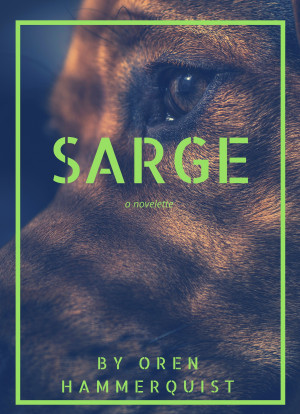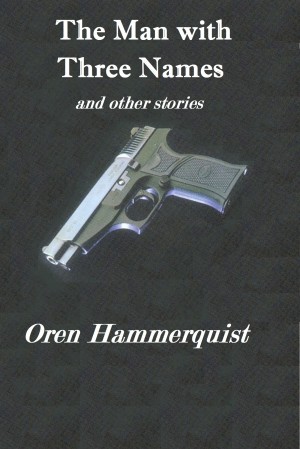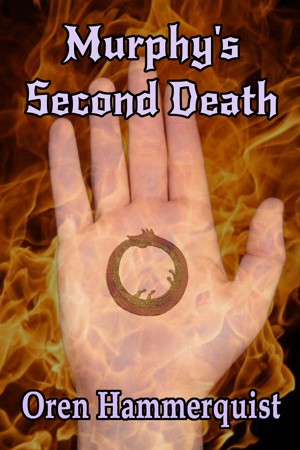Interview with Oren Hammerquist
Published 2014-01-19.
What do your fans mean to you?
I am still in the process of building a fan base. As it stands, I have the best fans possible at the moment--friends and family. There is a bit of vanity in the number of likes my Facebook page gets though, and how many followers my blog has. Everyone who reads my book gives me a little bit of an ego boost.
One of he most positive aspects of the indie/self-publishing phenomenon is the increase in contact between writer and reader. It is too easy to forget after you get an advance that people are reading your book. All my fans can leave a comment on my page, or contact me directly at may website. I like that.
What are you working on next?
At the time of this interview, I haven't actually published my first novel--Murphy's Second Death--but I am mostly waiting for the cover to be finished. My next book is titled "Savage Animals." It is a zombie book in a way, but I have re-imagined the genre I think. A malfunction in a supercomputer linking humans leaves all humanity at the mercy of the most bestial instincts.
There are three groups of people--Allies, Adversaries, and Raiders. The Allies are linked by brain implants that allow for instant communication and knowledge. The Adversaries do not have these implants, and live rather industrialized and agricultural lives often providing luxury items--such as fresh vegetables, liquors, and even folk art--to the Allies. The Allies can live happily without these items. The Raiders are a series of groups that pushed away the society of the other two classes, and live mostly as criminals in nomadic clans--and levy payments that are half tribute, half bribe to leave the Adversaries alone.
All three of these groups hate the others, but they are forced to work together to save mankind.
After that, I have several other books, a poetry chapbook, and a collection of short stories coming in the next few years. I plan one release per year.
Who are your favorite authors?
How many words am I allowed to write? It probably isn't enough. Larry Niven is one of my favorites. He often works together with Jerry Pournelle on books such as "The Mote in God's Eye." "Ringworld" and Niven's collections of short stories are also among my favorites.
Issac Asimov, Philip Dick, Robert Heinlein, Orson Scott Card, and Arthur C. Clarke are among my favorites. I feel that Walter M. Miller Jr. receives far too little notice, but that is probably because he only wrote one novel. Everyone should read "Animal Farm" at least twice, and a careful look at "1984" is not a bad idea either. And, of course, you cannot ignore the classic writers: H. G. Wells, Jules Verne, and especially Edgar Rice Burroughs.
Out of the genre, I loved Harper Lee's one book "To Kill A Mockingbird," and feel it should be on everyone's required reading list. "Catch 22" should not be required reading, but I enjoyed it greatly. To throw out an author no one has heard of but everyone should have, Daphne du Maurier.
What inspires you to get out of bed each day?
My alarm clock; I always put it out of arm's reach. I set an alarm even on days I do not have to work.
A more serious answer: My wife and kids. Everything I am today is really due to them. Nothing changes you like having children. I have three girls, and each one probably has me wrapped around their finger. I think I am a strict and loving father, but who really knows? They inspire me though, and so does my wife--who both loves and puts up with me as the day requires.
When you're not writing, how do you spend your time?
I just finished my bachelor of arts in criminal justice and an undergraduate certificate in paralegal studies. My job takes much of my time--military--and often keeps me away from home. It also requires me to work out on my off time. Every year seems to take a little more time each day at the gym just to keep healthy.
I am hoping to spend much more time with my wife and kids now that my degree is done. I love movies though I tend to fall behind when we can't get a babysitter. And of course, I read everything possible. I am looking forward to being able to read what I want now that I am not taking two classes per month.
In other words, when I'm not swamped from life I write. It has never been the other way around.
How do you discover the ebooks you read?
Largely off of what everyone else is reading. I find it helpful to check out books recommended when you look up a specific author. Any time a movie comes out, I try to read the book first. Other sites such as Goodreads help too.
Do you remember the first story you ever wrote?
Technically my first story was written at 4 years old. I didn't learn to read until I was 5. I used the stapler to put a dozen or so pages together, and then scribbled "words" across every page. I bound it backwards too, but I think we can excuse that since I didn't actually know how to read. It was about superman and batman I think. Since my mother read extensively and my father literally reads a book a day minimum, a psychiatrist might see more in that than most.
The first real story I remember writing was either a story about a mosquito that thinks flies are stupid for flying into fly paper and then flies into a bug zapper, or a story I wrote about real events in Belmez, Spain where faces appeared on the floor and walls of a house. The second as creepy but not fully appreciated, and the first was described by one publisher as "too didactic." The mosquito story was the first I tried to publish, and I didn't try again for fifteen years. I think they both still have promise. I may find a place for them one day--after extensive rewrites.
What is your writing process?
First, I caffeinated heavily. Technically that is part of my waking up process every day too. My process varies somewhat, but I generally consider a piece in my head for some time before putting it down. Some books come easily--"Murphy's Second Death" was like that--while others don't want to happen--I have one book called "Immunity Vectors" that I have restarted three times now. I usually put about 3,000 words down at a time, and then set it aside. That is the hardest part. After I finish, I am usually hyped up (though it took a long time to get there) and I want to show the world. If it is a book, I won't touch it, look at it, or edit it for one month. Short stories and poems I like to give one week.
I then read back through looking for every word that I could possibly cut out. Of particular concern to me is my terrible habit to ignore verb agreement on my first draft, and the tendency to overuse passive voice when I get stuck. I have to work carefully to fix those.
Once the major edit is done, I go back through checking for punctuation, spelling, and ambiguity. I usually to at least two passes on this. Then, it is finally ready for the world.
Do you remember the first story you ever read, and the impact it had on you?
I don't know if I could remember the first story I ever read, but I know that I was raised on Dr. Seuss and Golden Books. Oddly, "The 501 Hats of Bartholomew Cubbins" was probably the one that caught my attention most as a kid. It is much more narrative than most of Dr. Seuss' work.
From there, I moved on to Encyclopedia Brown and the Romona series. Then, it was Hardy Boys and Tom Swift. The first stories that really had an effect on me were the works of Edgar Allan Poe, H. G. Wells, and Ernest Hemingway. This was around the time I was allowed to pick my own books to read, and I remember being amazed at how complex the stories were. You could close your eyes and envision everything that as happening. I would say that these three authors are probably most responsible for making me want to write.
How do you approach cover design?
I don't design my own covers. Well, technically I come up with ideas and find someone else to make them realistic. My first cover is designed by the man that published my first story. My wife is taking classes in photography right now, and I hope to work with her on my next cover.
I think I am a decent writer--maybe even a good writer--but I am not an artist. I can see covers in my head, but I have never been good at putting them down in practice.
Smashwords Interviews are created by the profiled author or publisher.
Books by This Author
Sarge
by Oren Hammerquist
"Sarge" tells the story of man's best friend in a deadly scenario. This short novelette carries as many twists and turns as a typical novel as the reader realizes the full story and import of one dog's survival leaves the reader guessing and second-guessing through the very last word of the sentence. This story is free to read by downloading the free sample of 100%.
Logiblas
by Oren Hammerquist
This novelette, about 15,000 words, tells the story of a missionary in mortal danger from a superstition. I invite you to read this title for free and to share it with your friends. Download the free sample, which is 100% of the title, and enjoy. If you choose to pay later, come back and purchase. I have set the price as low as Smashwords allows.
Murphy's Second Death
by Oren Hammerquist
When Murphy Cayce invents a machine that allows people to remember their former life, society begins to crumble around him. The price of immortality is high, but Murphy must face his own eternal nightmares before he can save the world.




